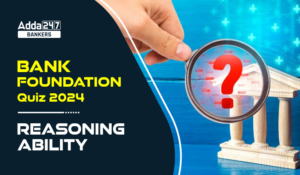Dear Readers,
We are providing you with 25 days study plan for reasoning. To score good marks in reasoning, only one thing can help you that is practice. As you all have observed from past exams that maximum portion consist of puzzles which required a lot of practice. So, from now onward quizzes on Bankersadda will be according to the given study plan and this will help you to prepare important topics in limited time. Today is DAY 1 of the study plan and today’s chapter is Blood Relation.
Directions (1-3): Study the following information carefully and answer the questions given below:
K is mother of D, who is sister of J. G is father of H. E is wife of G. J is son of H.
Q1. How is D related to G?
(a) Son
(b) Grandson
(c) Granddaughter
(d) Daughter
(e) None of the above
Q2. How is E related to K?
(a) Mother-in-law
(b) Sister
(c) Mother
(d) Can’t be determined
(e) None of the above
Q3. How many children does H have?
(a) One
(b) Two
(c) Three
(d) None
(e) None of the above
Directions (4-6): Study the following information carefully and answer the questions given below:
Q is married to V. P is daughter of V. N is son of E. G is mother-in-law of E. V is brother of G. S is son of R, who is married to G.
Q4. How is S related to N?
(a) Sister
(b) Father
(c) Mother
(d) Grandfather
(e) None of the above
Q5. How is P related to G?
(a) Nephew
(b) Aunt
(c) Niece
(d) Father
(e) None of the above
Q6. What is the relation between V and R?
(a) Brother
(b) Sister-in-law
(c) Sister
(d) Brother-in-law
(e) None of these
Directions (7-9): Study the following information carefully and answer the given questions:
• T is sister of D. D is married to P. P is son of M.
• T is mother of J. Y is father of U.
• Y has only one son and only one daughter.
• U is daughter of T. Q is son of D.
Q7. How is P related to T?
(a) Brother
(b) Cannot be determined
(c) Brother-in-law
(d) Cousin (brother)
(e) Uncle
Q8. How is J related to D?
(a) Son
(b) Niece
(c) Son-in-law
(d) Nephew
(e) Daughter
Q9. How is Q related to M?
(a) Son-in-law
(b) Grandson
(c) Nephew
(d) Son
(e) Cannot be determined
Directions (10-12): Study the following information carefully and answer the questions given below:
N are father of R and T and husband of P.
M is father of V and L is mother of K.
V and K are cousin sisters.
R is maternal uncle of V.
N has only two children.
Q10. How is M related to P?
(a) Son
(b) Daughter
(c) Son-in-law
(d) Can’t be determined
(e) None of the above
Q11. How is L related to T?
(a) Sister-in-law
(b) Brother
(c) Sister
(d) Daughter
(e) Can’t be determined
Q12. How is K related to N?
(a) Daughter
(b) Granddaughter
(c) Grand son
(d) Son
(e) None of the above
Directions (13-15): Study the following information carefully and answer the questions given below:
‘A @ B’ means ‘A is sister of B’
‘A % B’ means ‘A is son of B’
‘A $ B’ means ‘A is mother of B’
‘A # B’ means ‘A is father of B’
Q13. How is D related to W in the given expression?
T @ Q % D $ P # W
(a) Mother
(b) Grandfather
(c) Grandmother
(d) Can’t be determined
(e) None of these
Q14. How is A related to B is the given expression?
V $ B # E @ M % A
(a) Husband
(b) Brother
(c) Son
(d) Wife
(e) None of these
Q15. Which of the following symbols should come in place of the question mark (?) to make the expression H is grandfather of E?
D % H # T ? K # E
(a) @
(b) %
(c) $
(d) #
(e) Can’t be determined



 General Awareness Quiz for Bank Mains Ex...
General Awareness Quiz for Bank Mains Ex...
 English Language Quiz For Bank Foundatio...
English Language Quiz For Bank Foundatio...
 Reasoning Quiz For Bank Foundation 2024 ...
Reasoning Quiz For Bank Foundation 2024 ...




